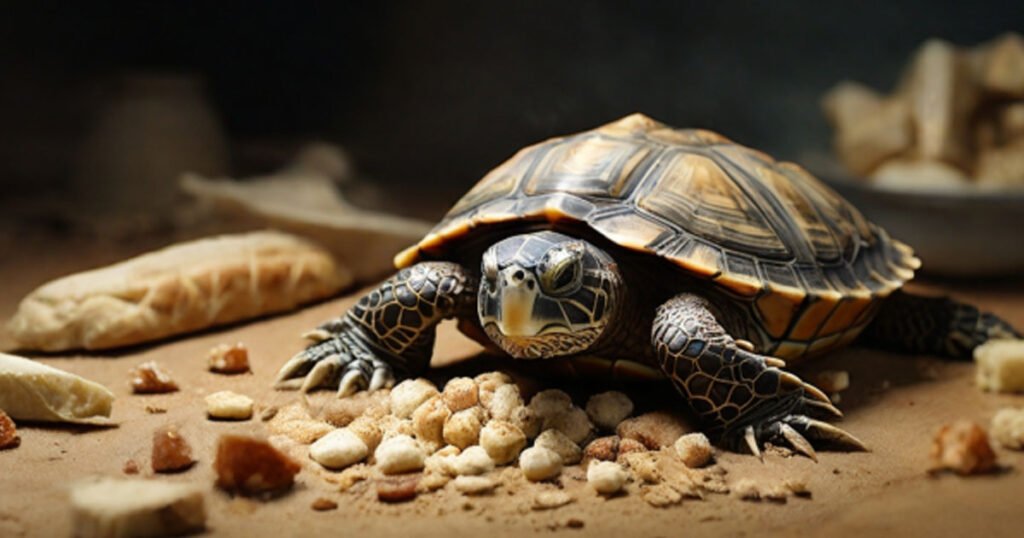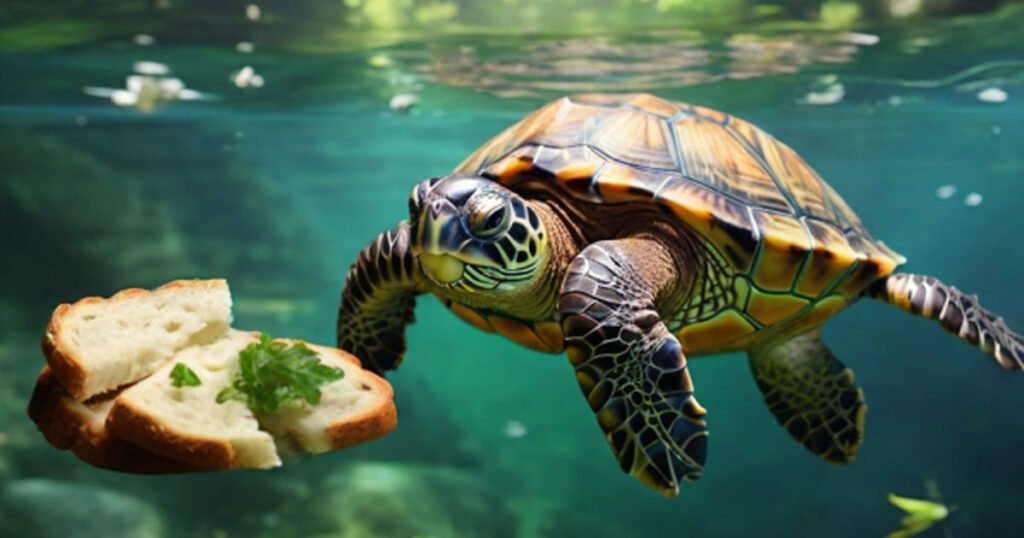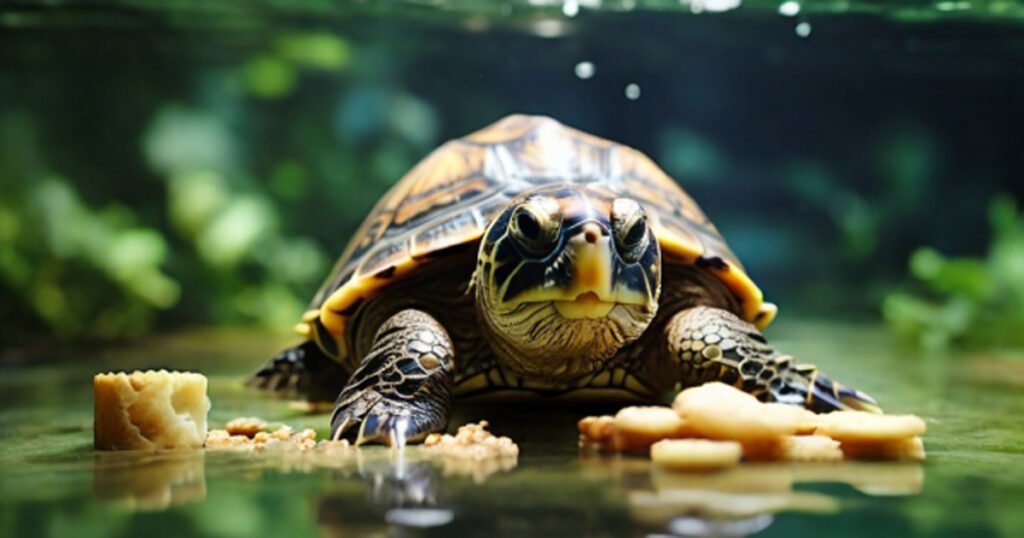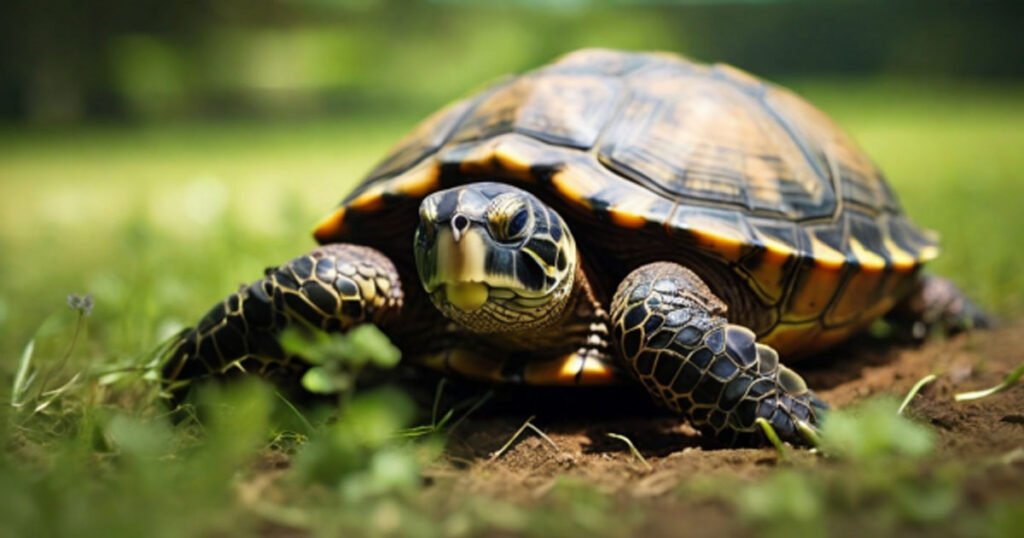Turtles have become increasingly popular as pets, charming their way into our homes with their distinctive shells and unique personalities. As a pet turtle lover the question “Can turtles eat bread?” is common. If you own one of these adorable reptiles, you know that providing the right diet is crucial.
Not only this but if you go to any of your nearest animal parks or zoos, you are likely to see turtles. Many of the visitors have an interest in feeding them, and many times, we see bread as a common food served to them by visitors. Is bread good for turtles? Finding out these ancient creatures’ meal preferences is essential for their well-being.
In this exploration, we’ll dive into “Can turtles eat bread?” and the world of turtle diets. Also, we will discuss what makes a meal turtle-friendly and what should be left out of their menu.
Can Turtles Eat Bread?

Yes, turtles can eat small pieces of bread, and they’ll even eat anything you give them. However, the real question is whether bread is a good choice for our shelled companions. Does it provide nutritional value, or is it just a bland filler in their diet?
While turtles will take a piece of bread, it doesn’t provide any nutritional value for them. Bread lacks essential nutrients for turtle well-being. Although bread is nontoxic for turtles, you should not include it in their diet. So, if your turtle takes a small bite, they’ll likely be fine. If you want your turtle to have a more balanced and nutrient-rich diet, don’t feed them wheat meal.
Is Bread Bad for Turtles’ Diets?

Turtles (wild and pet both) are omnivore eaters, so they eat insects, worms, fish, plants, and more. However, bread creates nutritional challenges for these creatures. Even in captivity (pet condition), they can’t handle human food properly.
Turtles can’t digest bread well because they don’t have the right enzymes to break the bread ingredients. Because turtles can’t break down these foods, they don’t get the vitamins and nutrients they need to grow and stay healthy. An inadequate diet, especially lacking calcium, can result in health issues like metabolic bone disease, which can be fatal for your pet.
While turtles may eagerly eat bread, if anyone gives them the absence of vital components can lead to health issues. Since turtles are omnivores, a well-balanced diet that aligns with their omnivorous nature is crucial.
Turtles and Bread: Not a Digestive Match

Dairy ingredients mixed with bread are not easy for turtles to digest. Certain breads include dairy ingredients like milk. While turtles consume both animal- and plant-based foods, dairy contains lactose, which their bodies can’t break down due to lacking the necessary enzymes.
Also, bread poses health risks for turtles due to ingredients like baking yeast, garlic, etc., which can cause infections. Some chemicals and preservatives from some commercial bread may harm turtles if ingested regularly. When your turtle ignores the bread in its habitat, it may contribute to water pollution, clouding the tank, and compromising hygiene.
Risk of Digestive Blockages from Larger Bread Pieces

Now that we’ve learned about bread’s effects on turtle digestion, it’s important to explore another concern— the risk associated with bigger bread pieces. While turtles may eat small bread pieces without significant harm, providing larger chunks can cause risks.
The danger lies in potential blockages within their digestive system. Larger pieces might not pass through quickly, leading to impaction, infections, and digestive problems. If you’re giving them bread, make sure the portions are bite-sized so their digestive system doesn’t face any blockage.
Feeding turtles bread, especially in large amounts, also can contribute to bacterial infections and long-term consequences. If not properly processed, items like bread may lead to harmful bacteria buildup. It causes infections in the turtle’s digestive system.
What Do Turtles Eat?
So, what can turtles eat? Let’s get into that –
Carnivores, Herbivores, and Omnivores: Diverse Turtle Diets
Turtles, with their diverse species, exhibit a wide range of diets. Some turtles are carnivores, they like meat, while others adhere to a vegetarian lifestyle. The omnivorous category includes turtles that enjoy both meat and vegetables. Leatherback sea turtles prefer jellyfish, while red-eared sliders savor earthworms and leafy greens. Land turtles are more likely fond of beetles, fruit, and grass.
Pet Turtle Nutrition: A Varied and Balanced Diet
For pet turtles, especially omnivores, their diet evolves with age. Younger turtles require more meat, transitioning to a balanced intake of meat, vegetables, and fruit as they mature. Some baby turtle loves cucumber. Suggested foods range from cooked chicken and sardines to tuna to dandelions, cantaloupe, and bananas. The right diet varies based on species and age, emphasizing a diverse and balanced approach.
Snacks for Turtles: Nutritionally Friendly Options
If you are seeking nutritional snacks for turtles, options like lettuce, peas, broccoli, fruits, and various proteins like earthworms and crickets are recommended. You can give turtles a mix of commercial pellets and supplementary items for optimum health. Protein requirements for different ages of turtles focus on a well-rounded diet of plant and animal products. It’s important to know what food to feed your turtles so they get the best nutrition.
How Much Bread Can Turtles Safely Consume?
Turtles, often seen as enthusiastic eaters, might devour a piece of bread you toss into their enclosure. Even if they occasionally eat a small piece of bread, replacing their proper meals with bread can deprive them of essential nutrients. If you run low on turtle food, sometimes you can give them bread, but not regularly.
As long as your turtle seems healthy and hasn’t been exposed to harmful substances, occasional wholemeal bread might be fine. Yet, closely monitor your pet’s behavior and appearance for adverse effects. Some turtles may not immediately show signs of harm, making it challenging to detect potential issues.
Digestive difficulties, such as unusual odors in droppings or constipation signs, could indicate a problem. If suspected, gradually eliminate bread and observe positive changes. Seek veterinary care if your turtle has ingested non-food items or displays discomfort, vomiting, or diarrhea. Keep in mind that turtles can conceal pain really well, so keep an eye on them.
While rare cases show turtles tolerating small amounts of factory-made bread, this isn’t recommended or guaranteed practice. Each turtle’s tolerance varies, and regular monitoring is essential for their health.
What Foods Are Harmful For Turtles?
Feeding turtles can be confusing, but here’s a simple rule: never think that all types of human food are meant for them. A basic tip is to avoid offering anything meant for human consumption to turtles, particularly items like fried items, burgers, pizza, wheat-made food, etc. Raw meat, fish, or chicken is also a no-go, considering the potential presence of bacteria.
Additionally, certain vegetables, including parsley, chives, and spinach, should be omitted due to high oxalate levels, which can be harmful. A veterinarian can give you a comprehensive understanding of your turtle’s diet, making sure their nutrition matches their needs.
Read More: How To Clean A Turtle Shell
Bottom Line
So, now you know the answer to the question can turtles eat bread? While turtles may munch on bread occasionally, it’s not a healthy choice for their regular diet. Bread lacks essential nutrients and can lead to digestive issues. To keep your shelled friend happy and healthy, go for a diet closer to their natural one. Fresh fruits, veggies, and specially formulated pellets are a better choice, ensuring a well-balanced and nutritious meal for your turtle.
